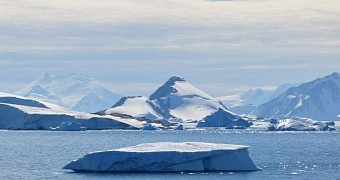As it turns out, climate change and global warming are nothing if not creative when it comes to finding new ways to mess with the planet. Long story short, they're now busy altering Earth's gravity.
In a recent paper in the journal Geophysical Research Letters, researchers with the European Space Agency say that, between the years 2009 and 2012, the ice sheet covering West Antarctica shrunk to such an extent that the local gravity field was distorted.
More precisely, it appears that ice loss in this part of the world translated into a dip in the region's gravity field. Granted, this decrease was unimpressive enough not to cause local landscapes to levitate, but it did happen.
The scientists behind this research project warn that, unless climate change and global warming are put on a tight leash sooner rather than later, chances are such shifts in the Earth's gravity will become a common occurrence in Antarctica.
Measuring changes in Earth's gravity field
As detailed in the journal Geophysical Research Letter, the scientists who pinned down the link between ice loss and gravity field changes in Antarctica did so with the help of the European Space Agency's GOCE satellite and the American-German orbiter GRACE.
Of these probes, the first has spent the past few years taking high-resolution measurements of our planet's gravity. The latter is in the business of using gravity data to measure shifts in ice mass, Science Daily explains.
When information provided by GOCE and GRACE were put together and analyzed as a set, it became clear that, between 2009 and 2012, ice loss in West Antarctica went hand in hand with a dip in the local gravity field. Check out the animation below to see the two data sets overlaid.
Admittedly, Earth's gravity is by no means uniform. On the contrary, it is influenced by ocean trenches, mountains, and even the planet's rotation. Still, having ice loss caused by global warming and climate change toy with the gravity field is reason enough to worry.
Are we losing Antarctica?
By the looks of it, we most certainly are. Thus, information obtained with the help of the European Space Agency's CryoSat satellite shows that, since 2009, seasonal ice melt in West Antarctica has sped up by a factor of three.
What's more, scientists say that, between the years 2011 and 2014, Antarctica as a whole has been shrinking in volume at a rate of 125 cubic kilometers (30 cubic miles) a year. True, it will probably be a while until this region undergoes any drastic transformations. Still, this does not change the fact that we should try and limit climate change and global warming while there is still time.

 14 DAY TRIAL //
14 DAY TRIAL //